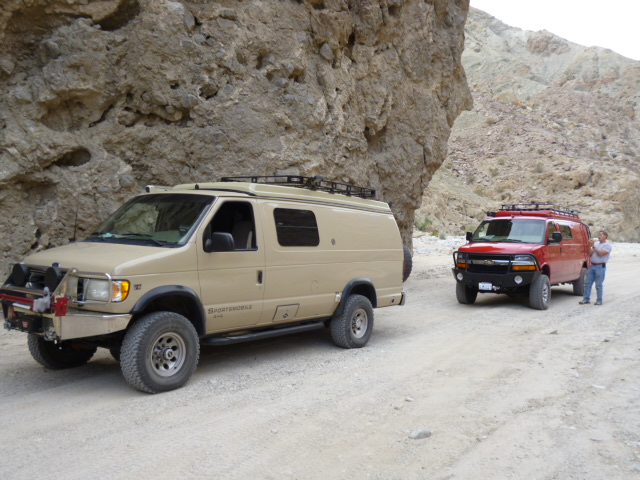
27
Mar 2023











Overlanding is a type of self-reliant travel that involves exploring remote and off-road areas using a vehicle that is equipped for camping and living on the road. The goal of overlanding is to experience adventure, explore the natural beauty of the world, and immerse oneself in the culture of the places visited.
Overlanding can be done in any type of vehicle, from a rugged 4×4 to a modified van or even a motorcycle. What sets overlanding apart from other types of travel is the emphasis on self-sufficiency and self-reliance. Overlanders are typically prepared to handle a range of challenges, from mechanical breakdowns to inclement weather and unexpected obstacles on the road.
One of the key benefits of overlanding is the freedom it provides. Overlanders are not bound by schedules or itineraries and can adjust their plans as they go. This flexibility allows them to explore areas that are off the beaten path and to take their time enjoying the journey.
Overlanding is also an excellent way to connect with nature. Overlanders can camp in remote locations and experience the peace and solitude of being in the wilderness. They can also enjoy a wide range of outdoor activities, such as hiking, fishing, and wildlife watching.
Another benefit of overlanding is the opportunity to connect with people from different cultures. Overlanders often travel to remote areas where they can interact with locals and learn about their way of life. This can be a transformative experience that broadens one’s perspective and deepens their understanding of the world.
Of course, overlanding also comes with its own set of challenges. One of the biggest challenges is ensuring that the vehicle is properly equipped for the journey. This can involve installing modifications such as off-road tires, a winch, and a roof rack to carry gear. Overlanders also need to be prepared for emergencies and have the necessary tools and supplies on hand to handle unexpected situations.
Overlanding also requires a certain level of self-sufficiency. Overlanders need to be able to cook, clean, and maintain their vehicle on their own. They also need to be able to navigate using maps and GPS, and to communicate in areas with limited cell service.
In conclusion, overlanding is a unique and rewarding way to travel that offers the opportunity for adventure, connection with nature, and immersion in different cultures. It requires a certain level of preparation and self-sufficiency, but the freedom and flexibility it provides make it well worth the effort. For those looking to escape the beaten path and explore the world on their own terms, overlanding is an excellent choice.
| Cookie | Duration | Description |
|---|---|---|
| _cfuvid | session | set when a site uses this option in a Rate Limiting Rule |
| axp-override | session | Description is currently not available. |
| bm_sv | 2 hours | Akamai Botman Manager to help differentiate between web requests generated by humans and web requests generated by bots |
| CX_214487239 | 1 year | Description is currently not available. |
| ep203 | 3 months | Surveymonkey sets this cookie to mitigate account sharing. |
| m | 1 year 1 month 4 days | No description available. |
| product_type | 1 year 1 month 4 days | Used by the Aluminess Garage |
| sm_rec | session | Stores unencrypted user data. Expiry time based on the "remember me" button on login. |
| tracker_device | 1 year 1 month 4 days | Affirm sets this cookie to track installment payments on the Razer Store. |
| VISITOR_INFO1_LIVE | 6 months | YouTube sets this cookie to measure bandwidth, determining whether the user gets the new or old player interface. |
| VISITOR_PRIVACY_METADATA | 6 months | YouTube sets this cookie to store the user's cookie consent state for the current domain. |
| yt-player-headers-readable | never | The yt-player-headers-readable cookie is used by YouTube to store user preferences related to video playback and interface, enhancing the user's viewing experience. |
| yt-remote-cast-available | session | The yt-remote-cast-available cookie is used to store the user's preferences regarding whether casting is available on their YouTube video player. |
| yt-remote-cast-installed | session | The yt-remote-cast-installed cookie is used to store the user's video player preferences using embedded YouTube video. |
| yt-remote-connected-devices | never | YouTube sets this cookie to store the user's video preferences using embedded YouTube videos. |
| yt-remote-device-id | never | YouTube sets this cookie to store the user's video preferences using embedded YouTube videos. |
| yt-remote-fast-check-period | session | The yt-remote-fast-check-period cookie is used by YouTube to store the user's video player preferences for embedded YouTube videos. |
| yt-remote-session-app | session | The yt-remote-session-app cookie is used by YouTube to store user preferences and information about the interface of the embedded YouTube video player. |
| yt-remote-session-name | session | The yt-remote-session-name cookie is used by YouTube to store the user's video player preferences using embedded YouTube video. |
| Cookie | Duration | Description |
|---|---|---|
| __kla_id | 1 year 1 month 4 days | Klaviyo sets this cookie to collect information on the visitor’s behavior. This information is used for internal analytics and to optimise the website. It also registers if the visitor has subscribed to a news letter. |
| _ga | 1 year 1 month 4 days | Google Analytics sets this cookie to calculate visitor, session and campaign data and track site usage for the site's analytics report. The cookie stores information anonymously and assigns a randomly generated number to recognise unique visitors. |
| _ga_* | 1 year 1 month 4 days | Google Analytics sets this cookie to store and count page views. |
| _gat | 1 minute | Google Universal Analytics sets this cookie to restrain request rate and thus limit data collection on high-traffic sites. |
| _gcl_au | 3 months | Google Tag Manager sets the cookie to experiment advertisement efficiency of websites using their services. |
| _gid | 1 day | Google Analytics sets this cookie to store information on how visitors use a website while also creating an analytics report of the website's performance. Some of the collected data includes the number of visitors, their source, and the pages they visit anonymously. |
| _sp_id.* | 1 year 1 month 4 days | Snowplow sets this cookie to store user information that is created when a user first visits a site and is updated on subsequent visits. |
| _sp_ses.* | 1 hour | Snowplow sets this cookie to store user information that is created when a user first visits a site and is updated on subsequent visits. |
| _splunk_rum_sid | 15 minutes | Description is currently not available. |
| ajs_anonymous_id | 1 year | This cookie is set by Segment to count the number of people who visit a certain site by tracking if they have visited before. |
| ajs_group_id | 1 year | This cookie is set by Segment to track visitor usage and events within the website. |
| ajs_user_id | 1 year | This cookie is set by Segment to help track visitor usage, events, target marketing, and also measure application performance and stability. |
| ajscookies | 1 year | No description available. |
| ajstest | 1 year | No description available. |
| apex__sm | session | Salesforce analytics |
| chameleon-profile-id | session | Description is currently not available. |
| sm_dc | past | Description is currently not available. |
| smcx_214487239_last_shown_at | session | Description is currently not available. |
| yotpo_pixel | 9 hours | Description is currently not available. |
| ytidb::LAST_RESULT_ENTRY_KEY | never | The cookie ytidb::LAST_RESULT_ENTRY_KEY is used by YouTube to store the last search result entry that was clicked by the user. This information is used to improve the user experience by providing more relevant search results in the future. |
| Cookie | Duration | Description |
|---|---|---|
| __tld__ | session | Description is currently not available. |
| 3060738.3440491 | 1 year 1 month 4 days | No description available. |
| pixel | 1 year | This cookie is used to present the visitor with relevant content and advertisement. |
| test_cookie | 15 minutes | doubleclick.net sets this cookie to determine if the user's browser supports cookies. |
| YSC | session | Youtube sets this cookie to track the views of embedded videos on Youtube pages. |
| yt.innertube::nextId | never | YouTube sets this cookie to register a unique ID to store data on what videos from YouTube the user has seen. |
| yt.innertube::requests | never | YouTube sets this cookie to register a unique ID to store data on what videos from YouTube the user has seen. |
